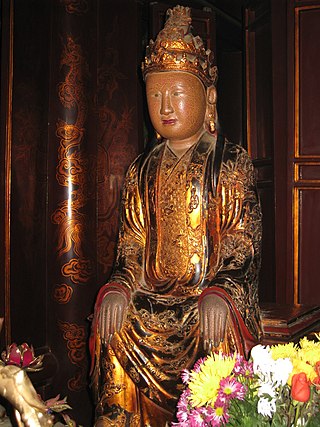Related Research Articles
Traditional Vietnamese personal names generally consist of three parts, used in Eastern name order.

Vietnam competed at the 2005 Southeast Asian Games in the Philippines under the IOC country code VIE. By sending a delegation of 516 athletes and competing in 33 out of 40 sports and in 352 out of a total of 439 events, it aimed for a top three placing in the medals table. The final result showed that the Vietnamese team has attained its goal by ranking first in the medal tally with 18 gold, 24 silver and 11 bronze medals. The chief of mission to the games was Nguyen Hong Minh.

Lệ Thủy is a district of Quảng Bình province in the North Central Coast of Vietnam. The district borders Quảng Ninh district on the north, Vĩnh Linh district on the south, Laos on the west. Lệ Thủy central is 40 km south of the provincial capital Đồng Hới. The district government seat is Kiến Giang Township. The district area is 1420.52 km2, population: 140,804 (1998). Lệ Thủy district is home to Võ Nguyên Giáp and the family of Ngô Đình Diệm. Economy bases on agriculture, mainly rice culture. Mỹ Trạch massacre by French army happened here on 29 November 1947.

Dương Thị Ngọc Vân courtesy name Vân Nga (雲娥) was the only empress dowager of the Đinh dynasty and afterwards empress of Lê Đại Hành, the first emperor of the Early Lê dynasty. When her husband Đinh Tiên Hoàng was assassinated in 979, Dương Vân Nga became the Empress Dowager of the Đinh dynasty as her son Đinh Phế Đế succeeded the throne. During the short-lived reign of Đinh Phế Đế, Dương Vân Nga and the general Lê Hoàn jointly held the regentship for the 6-year-old emperor, later it was Dương Vân Nga and general Phạm Cự Lượng who decided to cede the Đinh dynasty's throne for Lê Hoàn in 980 so that Đại Cồ Việt could stand the Song dynasty's invasion with a capable ruler. Subsequently, Lê Hoàn entitled Dương Vân Nga as his empress, hence she became the first woman in the history of Vietnam to be married to two emperors.

The Hanoi Metro is a rapid transit system in Hanoi, the capital city of Vietnam. Owned by Hanoi's People Committee and operated by Hanoi Metro Company (HMC), it is the first operational rapid transit system in Vietnam. The system includes elevated and underground sections. The first line, Line 2A, opened to service on 6 November 2021. The first section of the second line Line 3 opened on 8 August 2024.

Oanh Thi "Cecilia" Bui, written in Vietnamese as "Bùi Thị Oanh" and known by the stage name Lệ Thu, was a Vietnamese-American singer. Born in Hải Phòng, she was well known in South Vietnam in the 1960s and 1970s for singing the songs of singer-songwriters such as Trịnh Công Sơn and Phạm Duy. She released 24 singles and numerous albums with famous overseas Vietnamese singers like Khánh Ly, Hương Lan and Tuấn Ngọc.

The 1st Central Committee of the Indochinese Communist Party was in session from 1935 to 1951.

Vietnam Television, sometimes also unofficially known as the National Television, Saigon Television or Channel 9, was one of two national television broadcasters in South Vietnam from February 7, 1966, until just before the Fall of Saigon on April 29, 1975. It was the first television broadcaster in Vietnam.

Vietnam's Next Top Model, Cycle 4 is the fourth season of Vietnam's Next Top Model. It was broadcast on VTV in 2013, featuring 18 finalists including 8 male and 10 female contestants.
Nông Thị Xuân (1932–1957) was a mistress of president Ho Chi Minh, who mothered a child with Hồ and died in a vehicle accident shortly after. Xuân was an ethnic Nùng from Cao Bằng Province.

Mai Phương Thúy is a Vietnamese actress, model and beauty pageant titleholder who was crowned the 10th Miss Vietnam at the Vinpearl Resort in Nha Trang, Vietnam on August 26, 2006. She represented Vietnam at the Miss World 2006 pageant in Warsaw, Poland on September 30, in the Asia-Pacific group. She made the first cut In Miss World 2006 by winning the viewers' votes around the world.

The 8th Central Committee of the Communist Party of Vietnam (CPV) was elected at the 8th CPV National Congress. It elected the 8th Politburo and the 8th Secretariat.

The 7th Central Committee of the Communist Party of Vietnam (CPV) was elected at the 7th CPV National Congress. It elected the 7th Politburo and the 7th Secretariat.

The 6th Central Committee of the Communist Party of Vietnam (CPV) was elected at the 6th CPV National Congress. It elected the 6th Politburo and the 6th Secretariat.

The 5th Central Committee of the Communist Party of Vietnam (CPV) was elected at the 5th CPV National Congress. It elected the 5th Politburo and the 5th Secretariat.

The 4th Central Committee of the Communist Party of Vietnam (CPV) was elected at the 4th CPV National Congress. It elected the 4th Politburo and the 4th Secretariat.

The 3rd Central Committee of the Workers' Party of Vietnam (WPV) was elected at the 3rd WPV National Congress. It elected the 3rd Politburo and the 3rd Secretariat.

The 2nd Central Committee of the Workers' Party of Vietnam (WPV) was elected at the 2nd WPV National Congress. It elected the 2nd Politburo and the 2nd Secretariat.
References
- ↑ Elliott, Duong Van Mai, 1941– (1999). The sacred willow : four generations in the life of a Vietnamese family. New York: Oxford University Press. ISBN 0-19-512434-0. OCLC 39633628.
{{cite book}}: CS1 maint: multiple names: authors list (link) CS1 maint: numeric names: authors list (link) - ↑ Lam, rew; ContributorAuthor (6 September 2017). "Mai Elliot: War is a Scourge and Should Only Be Fought As A Last Resort". HuffPost. Retrieved 9 March 2020.
{{cite web}}:|last2=has generic name (help) - 1 2 3 Balaban, John (23 May 1999). "Thicker Than Water". Washington Post. ISSN 0190-8286 . Retrieved 11 March 2020.
- 1 2 3 4 5 6 7 8 Winterton, Bradley (18 September 1999). "Family history reveals a nation: The Sacred Willow by Duong Van Mai Elliott". South China Morning Post.
- ↑ Dean, Donna M. (April 2000). "Review of Elliott, Duong Van Mai, The Sacred Willow: Four Generations In The Life Of A Vietnamese Family". H-Minerva. Retrieved 12 March 2020.
- 1 2 3 4 5 Riechers, Maggie (31 December 1995). "Vietnam: Four Generations in the Life of a Vietnamese Family". Humanities. 16 (1): 40–44 – via Google Books.
- 1 2 3 4 "2004 Spring Life Stories: Mai Elliott | The Humanities Institute". www.scrippscollege.edu. 28 January 2014. Retrieved 12 March 2020.
- 1 2 3 Elliott, Mai (2010). "RAND in Southeast Asia: A History of the Vietnam War Era". www.rand.org. Retrieved 13 March 2020.
- ↑ Rod, Marc (16 November 2017). "Mai Elliott featured in Ken Burn's documentary". Claremont Courier. Retrieved 12 March 2020.
- 1 2 3 4 5 6 7 Davis, Rocío G. (2008). "Mediating Historical Memory in Family Memoirs: K. Connie Kang's Home Was the Land of Morning Calm and Duong Van Mai Elliott's The Sacred Willow". Biography. 30 (4): 491–511. doi: 10.1353/bio.2008.0019 . ISSN 1529-1456.
- ↑ Pye, Lucian W.; Elliott, Duong Van Mai (1999). "The Sacred Willow: Four Generations in the Life of a Vietnamese Family". Foreign Affairs. 78 (5): 184. doi:10.2307/20049511. ISSN 0015-7120. JSTOR 20049511.
- 1 2 Elliott, David W. P.; Elliott, Mai (1969). "Documents of an Elite Viet Cong Delta Unit: The Demolition Platoon of the 514th Battalion: Part One: Unit Composition and Personnel". www.rand.org. Retrieved 13 March 2020.
- 1 2 THE SACRED WILLOW | Kirkus Reviews.
- ↑ Pye, Lucian W. (1999). "The Sacred Willow: Four Generations in the Life of a Vietnamese Family". Foreign Affairs. 78 (5): 184. doi:10.2307/20049511. ISSN 0015-7120. JSTOR 20049511.
- ↑ "The Vietnam War, A New Film By Ken Burns and Lynn Novick, to Air Fall 2017 on PBS". PBS Press Releases. 6 December 2016. Retrieved 13 March 2020.
- ↑ Võ, Nguyên Giáp (1975). Unforgettable months and years, Những năm tháng không thé̂ nào quên. Elliott, Duong Van Mai. Ithaca, N.Y.: Southeast Asia Program, Dept. of Asian Studies, Cornell University. ISBN 0-87727-099-6. OCLC 2334117.
- ↑ Dinh, Nguyen Thi (31 December 2018). No Other Road to Take: Memoir of Mrs Nguyen Thi Dinh. Ithaca, NY: Cornell University Press. doi:10.7591/9781501718830. ISBN 978-1-5017-1883-0.